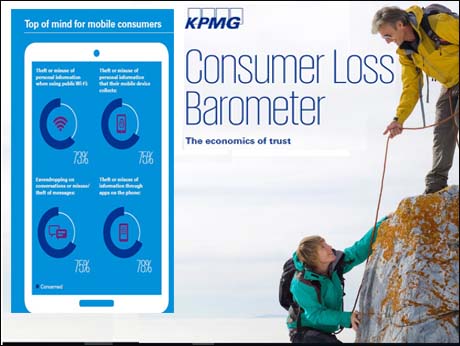
April 13 2019: The continuous evolution of digital transformation is outstripping the pace of cyber security in organizations. As a result, we’re witnessing a fundamental disconnect between consumer expectations and concerns, and the ability of organizations to meet those expectations, finds KPMG’s Consumer Loss Barometer report.
The global survey of more than 2,000 consumers and 1,800 Chief Information Security Officers (CISOs) identified a mismatch between the priorities of CISOs and consumers in the event of a breach.
Key India findings:
- The survey found that a 100 percent of executives in technology sector believe that their company’s information security function is highly engaged with the organization's digital transformation agenda. However, only 33 percent of executives in automotive sector believed so. The report revealed that a sizeable minority said executives were infrequently briefed on cyber security, with only 1 percent of the total number executives briefed on a monthly basis.
- 84 percent of the consumers prefer Mobile device usage over Apps and Cloud but 86 percent of respondents are also concerned about eavesdropping of their conversations or theft or misuse of their messages through their device. According to the report, more than 50 percent of respondents (52 percent) have limited personal information stored on the cloud primarily due to security and privacy concerns.
- On the other hand, the report also says that security leaders prioritize financial loss (60 percent), Costs of business disruption, recovery, and remediation (51 percent) and reputational risk (31 percent) over the impact on the relationship with consumers (21 percent).
- 51 percent of the respondents believe that additional levels of privacy and security should be embedded within the design of new types of “connected” devices.
- While, 59 percent believe that it is their own responsibility to ensure the devices you are using have been secured, only 16 percent of them believe that it is the financial institution’s responsibility to ensure that the device used by the consumer is secure.
- 38 percent say that the owner of connected cars also must own the enormous amount of consumer and vehicle data generated by the connected car. Contrarily, only 22 percent of them believe that car owners are responsible for its security and privacy.
- Around 87 percent of the consumers are concerned that retailers will misuse or improperly distribute their information. However, only 12 percent are uncomfortable with companies collecting Loyalty programme data.
- 41 percent believe that cyber security could enable growth by maintaining cyber hygiene in order to operate at peak efficiency and 43 percent believe it could be achieved by securing customer engagement.
- 69 percent say that the security professionals are getting adequate resources in terms of cyber security budgets.
- During a breach, security leaders are 60 percent concerned about financial loss/theft of financial assets and are least concerned about litigation costs (13 percent) and theft of data or intellectual property that reflects consequences for the business (17 percent)
“The proliferation of connected and IoT devices will have a cross-sector impact on areas around data security and privacy. In response to this, regulators will need to establish mandatory data security requirements,” says Atul Gupta, Leader - IT Advisory and Cyber Security Leader, KPMG in India. “This also presents an opportunity for organizations to build a trusted environment and position it as a selling point. Trust then becomes a differentiator in consumers’ buying decisions.”
For additional information, see here